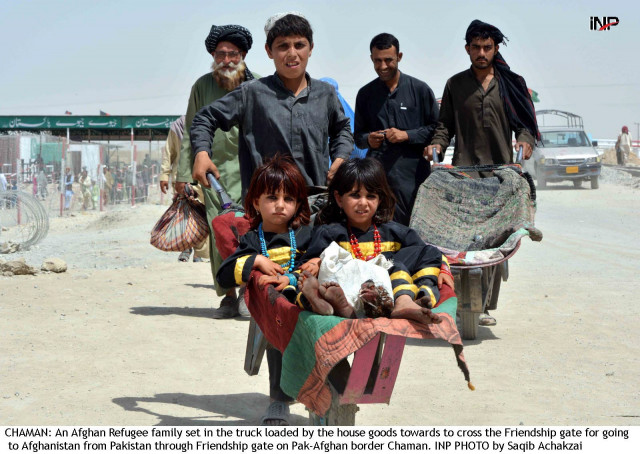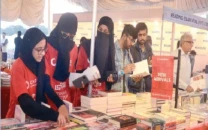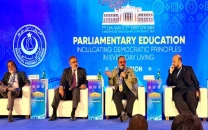Stay of Afghan refugees extended till year-end
Cabinet approves 31 items on meeting agenda; drops proposal for establishment of Ehtesab Commission.

PHOTO: INP
The federal cabinet met under the chair of Prime Minister Nawaz Sharif with a total of 32 items on its agenda. All items, except for the one related to Ehtesab Commission, were approved.
Minister for Law Zahid Hamid and Minister of State for Information Marriyum Aurangzeb later briefed the media about the decisions taken by the cabinet.
Afghan diplomat shot dead in Karachi
Aurangzeb said besides discussing the draft Electoral Reforms Bill, the cabinet gave approval for issuance of additional funds for treatment of patients suffering from fatal diseases under the Prime Minister’s Healthcare Programme.
The cabinet decided that 46 modern hospitals having 100 to 500 beds capacity would be built in all parts of the country on emergency basis to provide the latest healthcare facilities to the poor, she said.
The minister said Health Infrastructure Development and Management Company (HIDMC) would be established.
She said the report of Cabinet Committee Constituted for the People Affected by Indian Firing on the Working Boundary was also discussed in the meeting.
It was decided that Rs500,000 compensation would be given to the heirs of each person martyred in Indian firing in Sialkot and Narowal sectors and Rs150,000 for the treatment of each seriously injured.
“Moreover, 50 bunkers will be built along the Working Boundary so that people wandering at vulnerable positions could take refuge there during shelling,” Aurangzeb added.
Afghan refugees suffer harassment, abuses
About Afghan refugees, she said the registered Afghan nationals would be allowed to live in Pakistan till December 31, 2017 while the Interior Ministry would continue registration of the unregistered ones.
It was also decided that the Afghans cross-border movement would now be regulated through the visa regime and their entry passes would be linked with it.
Giving details of the draft Electoral Reforms Bill, Law Minister Zahid Hamid said the recommendations for electoral reforms had been prepared with consensus by the parliamentary committee.
“The Sub-Committee of the Parliamentary Committee on Electoral Reforms will mull over the required constitutional amendments before presentation of reforms bill to the parliament for approval,” he said.
Afghan refugees’ repatriation and management policy
After deliberation, the cabinet approved to extend validity of the Proof of Registration (PoR) cards to some 1.3 million registered Afghan refugees till the end of 2017.
Pakistan an exemplary host to Afghan refugees, says UNHCR rep
It also pledged to document Afghan nationals who currently have no identification and decided to adopt a national refugee law and a visa regime for different categories of Afghan nationals.
A five-category Afghan policy was approved which includes visa for business, investors, skilled, unskilled labourer, inter-marriages [family, spouse visit] and also visa for visitors with purpose of health and medical reasons.
According to the policy, businessmen, investors, students and labourers will get one-year multiple and extendable visas while five-year multiple visa will be permitted for spouses etc.
Afghan nationals visiting for medical purposes will be granted 45-day visa with one attendant extendable up to six-month on arrival at the border point.
“If the repatriation factors remain constant, the remaining population of less than 5,00,000 registered refugees will be dealt in 2018,” said the summary approved by the cabinet exclusively available with The Express Tribune.
200,000 Afghan refugees return in exodus from Pakistan: UNHCR
The government also hopes that about 640,000 refugees will return in 2017 and the year will be declared as the year of solutions and repatriation. Official figures state that over than 700,000 Afghan returned in 2016 and the number might plummet in 2017.
UNHCR welcomes
The UN refugee agency (UNHCR) and Afghan Ambassador to Pakistan Omar Zakhilwal welcomed the federal cabinet’s decision.
Talking to The Express Tribune, Zakhilwal said: “I am grateful to Pakistan cabinet’s approval of Safron proposals for refugees. These proposals were put together in consultation with us and if implemented will respond to some of the pressing needs or difficulties of the Afghans residing in Pakistan.”
Ehtesab Commission dropped from agenda
Sources said the premier, after consultations with his aides, deemed it suitable to defer the move related to Ehtesab Commission “for some appropriate time,” knowledgeable circles shared with The Express Tribune. The insiders’ privy to the cabinet meeting said the PM exchanged notes with his close aides including Finance Minister Ishaq Dar and Law Minister Zahid Hamid before deciding to drop the said agenda item that was third in the list of 32 agenda items.
Afghan refugees in Pakistan feel heat of rising regional tensions
Earlier last year, the PML-N’s federal government considered setting up an Ehtesab Commission in an apparent bid to clip powers of the National Accountability Bureau (NAB) after it initiated high-profile inquiries into mega corruption cases. (With additional input from our correspondent)
Published in The Express Tribune, February 8th, 2017.



















COMMENTS
Comments are moderated and generally will be posted if they are on-topic and not abusive.
For more information, please see our Comments FAQ